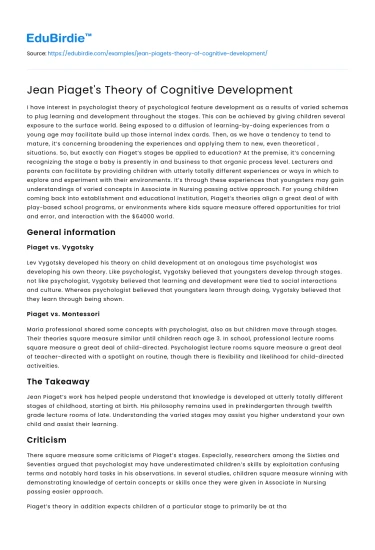Introduction
Jean Piaget's theory of cognitive development has been a cornerstone in understanding how human intelligence evolves, especially during childhood. His theory, which emerged in the early 20th century, offers a comprehensive framework for examining the progressive stages through which children develop their thinking capabilities. Piaget proposed that cognitive development is not just about acquiring knowledge; rather, it involves the transformation of cognitive processes. This transformation occurs through four main stages: sensorimotor, preoperational, concrete operational, and formal operational. Each stage characterizes a distinct way of thinking and understanding the world, marking significant cognitive milestones. While Piaget's theory has been influential in educational psychology and pedagogy, it has also faced critiques and evolved with contemporary research. This essay aims to delve into the intricacies of Piaget's theory, explore its application in real-world settings, and address critiques to provide a balanced perspective.
Transitioning from a general understanding of Piaget’s cognitive development theory, it is essential to delve deeper into the specific stages he identified. Each stage represents a unique period in a child's cognitive maturation, characterized by distinct abilities and limitations. By examining these stages, we can better appreciate the transformative journey of human cognition.
Save your time!
We can take care of your essay
- Proper editing and formatting
- Free revision, title page, and bibliography
- Flexible prices and money-back guarantee
Stages of Cognitive Development
Piaget identified four stages of cognitive development, each representing a different way of thinking and processing information. The first stage, known as the sensorimotor stage, spans from birth to approximately two years of age. During this period, infants learn about the world through their senses and actions. Piaget introduced the concept of object permanence during this stage, which is the understanding that objects continue to exist even when they cannot be seen or heard. This developmental milestone signifies a fundamental shift in how infants relate to their environment, transitioning from reflexive behavior to goal-directed activities.
The second stage is the preoperational stage, occurring between the ages of two and seven. This stage is characterized by symbolic thinking and the development of language skills. Children in this stage are able to engage in pretend play and can use symbols to represent objects. However, their thinking is still egocentric, meaning they have difficulty in seeing perspectives other than their own. An example of this is the classic "three mountains task," where a child is asked to describe what a doll sees from different positions on a model landscape. Children in the preoperational stage often struggle with this task, highlighting their limited ability to adopt viewpoints other than their own.
As children transition to the concrete operational stage, typically between the ages of seven and eleven, they begin to think more logically and systematically about concrete objects and events. They develop the ability to perform operations on objects in their mind, such as understanding the concept of conservation – the idea that quantity remains the same despite changes in shape or appearance. For instance, when water is poured from a short, wide container into a tall, narrow one, children at this stage can recognize that the amount of water remains unchanged. This marks a significant advancement in their cognitive abilities, as they begin to overcome the egocentrism that characterized earlier stages.
These stages lay the groundwork for understanding Piaget’s view of cognitive development as a dynamic process, marked by increasing complexity and abstraction in thought processes. The progression from concrete to formal operational thinking represents the culmination of cognitive maturation in Piaget’s framework.
Real-World Applications and Critiques
Piaget's theory has had a profound impact on educational practices, emphasizing the importance of stage-appropriate learning activities. For example, educators often design curricula that align with the cognitive abilities characteristic of each developmental stage. In the concrete operational stage, hands-on activities that involve manipulating physical objects can help children grasp abstract concepts. This approach aligns with Piaget’s belief that children learn best through active exploration and discovery.
However, Piaget's theory has not been without criticism. One of the primary critiques is that Piaget may have underestimated children's cognitive abilities. Subsequent research has demonstrated that, under certain conditions, children can exhibit more advanced cognitive skills than Piaget originally proposed. For instance, studies have shown that children as young as three can exhibit elements of logical reasoning when provided with familiar contexts or simplified tasks (Gelman & Baillargeon, 1983). This suggests that cognitive development may be more fluid and variable than the rigid stages proposed by Piaget.
Moreover, critics argue that Piaget's theory overemphasizes the role of maturation in cognitive development while underestimating the influence of social and cultural factors. Lev Vygotsky, a contemporary of Piaget, emphasized the importance of social interaction and cultural context in cognitive development. Vygotsky argued that children learn through collaborative dialogue and that cognitive development is a socially mediated process. This viewpoint complements Piaget’s theory by highlighting the interplay between individual cognitive processes and the socio-cultural environment.
The exploration of these critiques does not diminish the value of Piaget’s contributions but rather enriches the dialogue on cognitive development. By integrating insights from various perspectives, educators and psychologists can develop more comprehensive models of learning and development.
Conclusion
Jean Piaget's theory of cognitive development provides a foundational framework for understanding how children think and learn. His delineation of the sensorimotor, preoperational, concrete operational, and formal operational stages offers valuable insights into the cognitive transformations that occur from infancy through adolescence. While Piaget’s theory has been instrumental in shaping educational practices, it is important to consider its limitations and the critiques it has faced. By acknowledging the variability in cognitive development and the role of socio-cultural influences, we can build upon Piaget's work to develop more inclusive and dynamic approaches to learning. Ultimately, Piaget's legacy endures not only in the field of psychology but also in its enduring influence on educational paradigms and child development research.






 Stuck on your essay?
Stuck on your essay?

